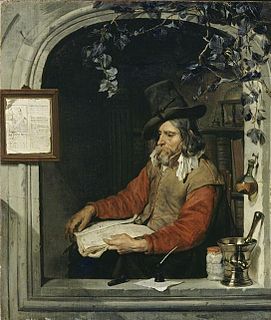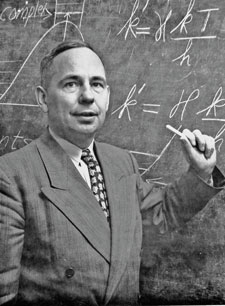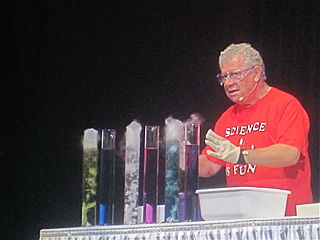
A chemist is a scientist trained in the study of chemistry. Chemists study the composition of matter and its properties. Chemists carefully describe the properties they study in terms of quantities, with detail on the level of molecules and their component atoms. Chemists carefully measure substance proportions, chemical reaction rates, and other chemical properties. In Commonwealth English, pharmacists are often called chemists.
This article contains links to lists of scientists.

Henry Eyring was a Mexico-born United States theoretical chemist whose primary contribution was in the study of chemical reaction rates and intermediates.
The Science Council is a UK organisation that was established by Royal Charter in 2003. The principal activity of The Science Council is the promotion of the advancement and dissemination of knowledge of and education in science pure and applied, for the public benefit. The Science Council is the Competent Authority with respect to the European Union directive 2005/36/EC.

The American Chemical Society (ACS) is a scientific society based in the United States that supports scientific inquiry in the field of chemistry. Founded in 1876 at New York University, the ACS currently has more than 155,000 members at all degree levels and in all fields of chemistry, chemical engineering, and related fields. It is one of the world's largest scientific societies by membership. The ACS is a 501(c)(3) non-profit organization and holds a congressional charter under Title 36 of the United States Code. Its headquarters are located in Washington, D.C., and it has a large concentration of staff in Columbus, Ohio.

The Royal Society of Chemistry (RSC) is a learned society in the United Kingdom with the goal of "advancing the chemical sciences". It was formed in 1980 from the amalgamation of the Chemical Society, the Royal Institute of Chemistry, the Faraday Society, and the Society for Analytical Chemistry with a new Royal Charter and the dual role of learned society and professional body. At its inception, the Society had a combined membership of 34,000 in the UK and a further 8,000 abroad. The headquarters of the Society are at Burlington House, Piccadilly, London. It also has offices in Thomas Graham House in Cambridge where RSC Publishing is based. The Society has offices in the United States at the University City Science Center, Philadelphia, in both Beijing and Shanghai, China and Bangalore, India.

Chemical Society of Peru is a non-profit scientific institution devoted to chemistry. It was founded in 1933 and groups to all the professionals related to natural sciences in which chemistry plays an important role, such as chemists, chemical engineers, chemical pharmacists, biologists, biochemists and physicians.
Chartered Chemist (CChem) is a chartered status awarded by the Royal Society of Chemistry (RSC) in the United Kingdom, the Royal Australian Chemical Institute (RACI) in Australia, by the Ministry of Education in Italy, the Institute of Chemistry Ceylon (IChemC), Sri Lanka, and the Institute of Chartered Chemists of Nigeria in Nigeria.

Robert L. Wolke is an American chemist, currently professor emeritus of chemistry at the University of Pittsburgh. He is a food columnist for The Washington Post, and has written multiple books, which aim to explain everyday phenomena in non-technical terms:
The European Chemical Society (EuChemS) is a European non-profit organisation which promotes collaboration between non-profit scientific and technical societies in the field of chemistry.

Cynthia "Cyndie" Anne Maryanoff is an American organic and materials chemist. Among other awards, she received the 2015 Perkin Medal for outstanding work in applied chemistry in the U.S.A.

Bassam Z. Shakhashiri is a professor of Chemistry at the University of Wisconsin-Madison, where he is the holder of the William T. Evjue Distinguished Chair. An active advocate for science education, he is the author of multiple books of chemical demonstrations. He was the 2012 president of the American Chemical Society and has received numerous awards and honors.

The German Chemical Society is a learned society and professional association founded in 1949 to represent the interests of German chemists in local, national and international contexts. GDCh "brings together people working in chemistry and the molecular sciences and supports their striving for positive, sustainable scientific advance – for the good of humankind and the environment, and a future worth living for."

A conservation scientist is a museum professional who works in the field of conservation science and whose focus is on the research of cultural heritage through scientific inquiry. Conservation scientists conduct applied scientific research and techniques to determine the material, chemical, and technical aspects of cultural heritage. The technical information conservation scientists gather is then used by conservator and curators to decide the most suitable conservation treatments for the examined object and/or adds to our knowledge about the object by providing answers about the material composition, fabrication, authenticity, and previous restoration treatments.

Nancy B. Jackson is an American chemist. She has done energy research on heterogeneous catalysis and the development of alternative fuels. She also works in the field of chemical nonproliferation, educating chemical professionals on the importance of safe and secure chemical practice in research, teaching and business, in an effort to prevent the misuse of chemicals as "weapons, poisons, explosives or environmental pollutants". She was the first implementer in developing the international Chemical Security Engagement Program. She is active in promoting diversity in STEM fields. She was president of the American Chemical Society in 2011, leading the organization during the International Year of Chemistry. In 2012, she was honored with the AAAS Award for Science Diplomacy.

Diane Grob Schmidt is an American chemist, who worked for Procter & Gamble Co. in Cincinnati, Ohio from 1981 to 2014. In 2015, she served as president of the American Chemical Society (ACS).
Pradyut Ghosh is an Indian inorganic chemist and a professor at the Indian Association for the Cultivation of Science. He is known for his studies on chemical sensing of anions, interlocked molecules and self-assembly and is a recipient of the Swarnajayanthi Fellowship of the Department of Science and Technology and the Bronze Medal of the Chemical Research Society of India. The Council of Scientific and Industrial Research, the apex agency of the Government of India for scientific research, awarded him the Shanti Swarup Bhatnagar Prize for Science and Technology, one of the highest Indian science awards, in 2015, for his contributions to chemical sciences.
Ethaline Hartge Cortelyou was an American chemist and scientific technical writer and editor who worked on the Manhattan Project at the University of Chicago's Metallurgical Laboratory and was one of 70 scientists to sign the 1945 Szilárd petition warning the United States government against dropping an atomic bomb on Japan. She also was a strong advocate for female scientists, strongly criticizing unequal treatment of women by employers and arguing that underutilization of women was holding back the United States' scientific advancement.











